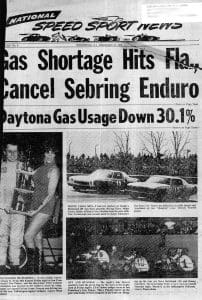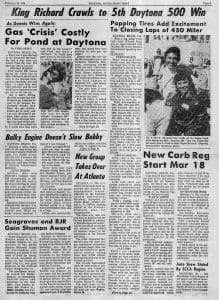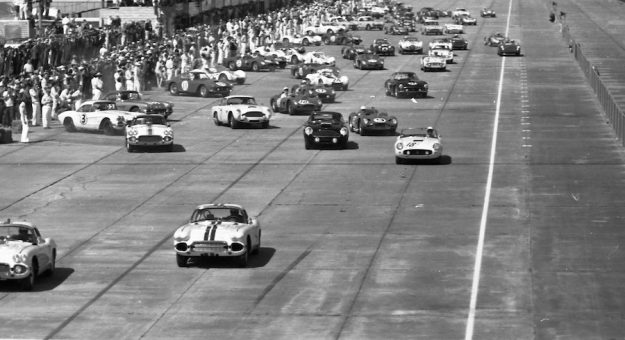Editor’s Note: Each month in recognition of SPEED SPORT’s 90th anniversary, the SPEED SPORT Insider will use the National Speed Sport News archives to look back at what happened in the racing world 50 years ago.
Top Story
Gas Crisis Impacts Motorsports: The energy crisis and a resultant shortage of gasoline had a major impact on the start of the 1974 racing season, as many race distances were shortened, fans were forced to make special arrangements for fuel when traveling to events and the 12 Hours of Sebring was canceled.
The Sebring race, which was scheduled for March 23, was called off during the last week in February. Previously, the traditional 12-hour length had been shortened to 745.6 miles to last between six and seven hours because of the energy crisis.

Efforts were made to reschedule the event at other Southern tracks in areas not so seriously affected by the gasoline shortage, but nothing materialized.
Alec Ulmann originated the event as a six-hour race on Dec. 31, 1950. It became a 12-hour race in 1952 and grew to attract the world’s most distinguished and talented drivers as well as crowds approaching 80,000.
Race organizer Reggie Smith told SPEED SPORT the gas shortage would make it difficult for the event to draw fans from South Florida, the state’s gulf coast and other highly populated areas.
Smith said that while the energy commission approved an allotment of fuel for the race, that would not help the travel plans of fans.
Earlier in the month, the Daytona 500 was shortened to 450 miles and the Daytona 300 reduced to 270 miles because of the energy crisis.
As well, numerous short tracks, including Florida’s Golden Gate Speedway, canceled events scheduled for early February.
Interestingly, the same week as the Sebring cancellation came news from Daytona Int’l Speedway that the nine days of Speedweek saw an all-time low in fuel usage at the 2.5-mile superspeedway. The statement said 428.8 barrels of fuel were used as opposed to 642 barrels used in 1973.
The 30.1 percent fuel savings was above the Federal Energy Office’s request of a fuel-usage reduction between 20 and 25 percent.
Other News
Smith In At Charlotte: Bruton Smith, one of the founders and first officers of Charlotte Motor Speedway, has returned to the helm of track, although he says he is not interested in running it.
“I’m not in the speedway business and have no intentions of running it. I just hope I can contribute something worthwhile to the track and the corporation,” said Smith, a wealthy automobile dealer.
Smith, who founded the 1.5-mile track along with the late Curtis Turner in 1959, was ousted when the corporation fell into receivership two years later. Smith was elected chairman of the board after the annual shareholders’ meeting Jan. 31.

Noise Pollution?: Illinois race fans, discouraged by reports that noise regulations would eradicate the sport in the state, have reason to cheer.
After an uphill fight against discriminatory noise regulations adopted by the state’s Pollution Control Board, the Ass’n for Motorsports of Illinois won its first battle.
In addition, AMS turned the enemy into an ally and revealed a three-point agreement between the Illinois Environmental Protection Agency and the AMS.
No USAC-SCCA Deal: The Sports Car Club of America and United States Auto Club jointly announced that negotiations between the two organizations will continue. The two parties have been unable to reach agreement on rules, regulations and prize money for a co-sanctioned open-wheel series for 1974.
Both clubs expressed hope that these differences can be resolved and an agreement reached on a joint sanction in 1975.
The Winners
Petty Wins At Daytona: After 59 lead changes in a race shortened to 450 miles because of the energy crisis, Richard Petty won an unprecedented fifth Daytona 500 at Daytona Int’l Speedway. Petty earned $36,650 before a crowd of nearly 100,000 at the 2.5-mile superspeedway.
Opp Goes In Tampa: Jan Opperman won three consecutive features to sweep the IMCA Winter National sprint car races at the Florida State Fairgrounds in Tampa. Opperman’s perfect performance came aboard Bill Smith’s Speedway Motors No. 4x non-winged sprint car.
Grandpa Sandbags: Iggy Katona, a 57-year-old racing grandfather, admitted he was “sandbagging” his way to victory in winning the ARCA 200 at Daytona Int’l Speedway.
“I sandbagged,” he said. “If there was $100 a lap up, I’d have led it more, but John Marcum (ARCA president) told me to ‘put on a good show,’ so I did.”
Spectacular Kenyon: Three-time USAC national midget champion Mel Kenyon was spectacular in earning his 72nd series victory inside the Cow Palace in San Francisco.
The Advertising Department
Champion Spark Plugs celebrated Benny Parsons’ 1973 NASCAR Cup Series title with an ad in National Speed Sport News touting the accomplishments of Champion and Parsons, titled “Winning the War.”
